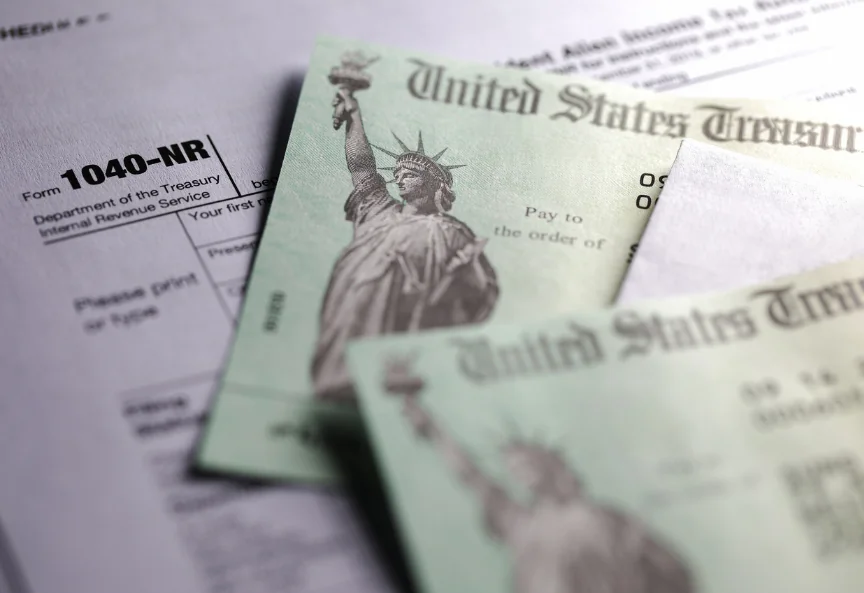With the rise of COVID-19, the United States has seen an increase in COVID related tax fraud. Here's how to protect yourself from these scams.
[lwptoc]
The IRS recently released a statement on the prevalence of COVID-19 related tax fraud, specifically text-based tax fraud scams that prey on people’s vulnerabilities by promising additional tax credits, economic payments, or stimulus checks, in exchange for personal information, an advance deposit, or similar commitments.
This type of scam is decades old but is still popular to fit an uptick of economic anxiety around the holidays after an especially tough year. With many people facing the last few months of the year after struggling to make ends meet, any help from the government – even if unorthodox in its delivery – might seem like a godsend.
However, while the IRS and US Treasury may still deliver additional monetary help if Congress comes to an agreement, neither agency or department would do so via a text message, a suspicious call, or any form of communication demanding personal information or financial information over the phone, or withholding payment until a “transaction fee” is paid out first.
Verifying Suspicious Communication
If you have received any suspicious communication from an entity claiming to be part of the IRS or the US Treasury, it’s critical that you double-check with official IRS news or notifications, contact the IRS or US Treasury through their respective hotlines or contact info, and speak with a tax professional.
Phishing attempts (trying to solicit information by pretending to be a legitimate institution) or tax fraud scams can be reported through the FBI, the Treasury Inspector General for Tax Administration, and through the IRS’ email for IRS-related phishing attempts (phishing@irs.gov). You can also report a COVID-19 related scam by calling the National Center for Disaster Fraud hotline (866-720-5721)
What Does COVID-19 Tax Fraud Look Like?
COVID-19 related tax fraud scams may include:
-
-
- Stealing economic impact payments (EIPs) from taxpayers.
- Selling fake testing kits.
- Offering fake cures or vaccines.
- Selling advice on fake or unproven treatments and marketing it as “evidence-based”.
- Marketing large quantities of medication and medical equipment, including personal protective equipment, and then claiming payments and failing to deliver any orders.
- Setting up fake charities to collect payments meant to go to struggling patients or families affected by COVID-19.
- Soliciting heavy investment in fake companies purportedly working on or researching the vaccine.
- Sending messages soliciting personal or financial information in exchange for government help or stimulus checks, from messengers allegedly working for or with the IRS or US Treasury Department.
-
Any criminal activity related to trying to solicit funds or information through the coronavirus pandemic should additionally be reported to the National Center for Disaster Fraud (NCDF) through their respective hotline (866-720-5721). Alternatively, you can also contact the NCDF through their website, and file a complaint.
Economic Impact Payment Tax Fraud
One particularly common scam following the release of the first stimulus check, or economic impact payment (EIP), is the EIP scam. Criminals may contact you claiming to be a bank or financial institution, stating that they would be able to exchange your stimulus check for cash.
Other criminals may attempt to impersonate IRS personnel or send emails claiming to come from the IRS or US Treasury, soliciting sensitive information from financial details to Social Security information, in exchange for an EIP.
If you have alternatively received a notice from the IRS through the USPS stating that you should have received your EIP, but have not received any payments, you should contact the Treasury Inspector General for Tax Administration and report your case. Your payment may have been stolen through identity theft.
Text Message Scams
Similar to the EIP tax fraud scam, a new text message scam has arose. Individuals are receiving a text message with the following: "you have received a direct deposit of $1,200 from COVID-19 TREAS FUND. Further action is required to accept this payment… Continue here to accept this payment …". The link in the text then takes the individual to a phishing website that looks similar to the IRS Get My Payment website.
If you have received a similar text message, the IRS requests that you:
-
-
- Screenshot the text message and email it to phishing@irs.gov
- Include the date/time/time zone that you received the text
- The phone number that received the text message
-
Beware of Fake Emails, Phishing Attempts, Suspicious Calls & Texts
Taxpayers must be extremely vigilant as online tax scams are becoming more common towards the end of the year.
Scammers will utilize spoofing techniques to obscure or mislead recipients on the origin of their messages or change names and emails in a minute way to try and fool recipients (such as changing a single letter or symbol).
When trying to scam specific individuals, scammers may take the effort to spoof a close friend’s email and name, claiming to need COVID-19 related help, or solicit important information.
Scammers will usually make their phishing attempts or scams as elaborate and official-looking as possible, with a very threatening message, to pressure taxpayers into taking immediate action without carefully processing the information on screen. Be skeptical of any official information or email you receive, even when it appears completely legitimate.
Finally, never click on links in suspicious emails. Even if you don’t give your information out freely, a hypertext link can lead to extreme adverse consequences by automatically downloading dangerous files onto your computer or leading you to a phishing front that appears like a real organization’s login screen, but is in fact just built to farm login information for criminals.
Instead, if you do receive an email or notification from your bank, the IRS, or the US Treasury, visit their official website first. Remember that no serious institution will ask for important information in an email.
Crucial Information on the IRS, US Treasury, and Tax Fraud Scams
The IRS will not send threatening emails, make threatening calls out of the blue, or ask you for any sensitive information via email or phone. The IRS will instead direct you to their website to login and verify your information.
Calls from the IRS typically only occur after the IRS sends ample notice via their physical mail, and taxpayers have the right to courteous and just treatment – which means they should never feel threatened or explicitly coerced to give out any sort of information.
Always be suspicious of anyone claiming to represent the IRS or the US Treasury. When in doubt, contact the IRS directly or speak with a tax professional. They will be able to verify whether you’re the victim of an ongoing tax fraud scam, and help you report the crime to the relevant federal authorities.
For More on Tax Relief and COVID-19
COVID-19 and EIP related scams and other examples of tax fraud and identity theft may be especially prevalent this year, as scammers never fail to capitalize on an opportunity to benefit from disaster or chaos.
If you’ve been told that you’re entitled to a second stimulus check, be sure to first check with official news sources and/or tax professionals if any additional tax credits have been approved by the IRS and US Treasury. If you are contacted by anyone claiming to represent the IRS, consider seeking a tax professional’s help to verify their claims and represent you.











